Identifying Entrepreneurial Opportunities
Introduction
Entrepreneurs play a big role in UK market because they introduce new business ideas which contribute to the development of UK’s economy. Entrepreneurs continuously search for new business idea in order to make change. However, sometimes the existing economy helps the entrepreneur to develop itself further (Griffin et al., 2014). The UK’s market is such a place where the entrepreneurs can perform their required activities without any constraints. In this report, the business idea for “The Burger Hub” has been analyzed by considering different types of theories and market data. In the beginning part of the report, the possible sources of business idea have been observed and then the viability of these ideas has been analyzed.
LO1 Evaluate possible sources for a new & innovation business idea
P1: Determining and evaluating different sources of entrepreneurial ideas and innovation
Entrepreneurs continuously search for new ideas from different sources. There are numerous open sources from where the entrepreneurs get the idea of opening new business and its prospects (Baye and Prince, 2017). There are different types of articles and journals that also provide new ideas and insight about some industries. Some possible sources from where 'The Burger Hub' can get the ideas are given below:
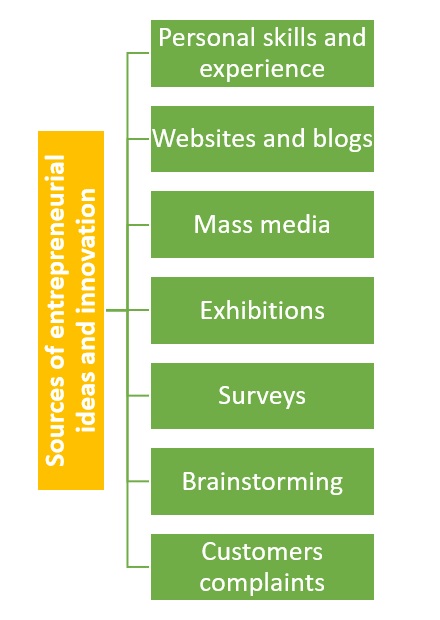
Figure: Some possible sources of Entrepreneurial ideas (Fonneland, 2017)
- Personal skills and experiences: Most of the ideas of the entrepreneurs are come due to their personal skills and experiences. The entrepreneurs observe the external business environment and try to find out possible opportunities. Personal skills of the entrepreneurs also help them to create new opportunities in their relevant
- Websites and blogs: Entrepreneurs can get the ideas of new business opportunities by using the websites and blogs that provide numerous business ideas time to time. The entrepreneur can get the insight about the new business from the personal experience of other entrepreneurs as they share their experience in blogs and social networking sites. Some websites like entrepreneur.com provide financial support and different articles to push the potential entrepreneurs (Aras and Crowther, 2012).
- Mass media: The entrepreneurs can also get the new ideas from mass media like newspaper, magazine and Several magazines publish industry-specific news that will give the entrepreneurs the true insights about the new business they are thinking about. Several successful entrepreneurs are appeared on tv channels and share their experiences about how they took the initiative and became successful.
- Exhibitions: Numerous exhibitions are helped in time to basis and the entrepreneurs can get new ideas about their business by attending the exhibitions and observing their products and policies (SALEEM, 2015). The entrepreneurs can also get the current status of entrepreneurial initiatives as the new entrepreneurs attend these exhibitions to promote their new products and services.
- Surveys: Entrepreneurs can also get the answers to their specific queries by performing the survey. They can take necessary steps by following the survey as the information generated from the survey is primary information (Botten, 2006). The survey gives both the important insights about the condition of the customers and the competitive information. As a part of conducting the report, I have collected some information for 'The Burger Bar' about the customers and the market.
- Brainstorming: Brainstorming refers to the technique that generates useful solution for a specific problem. When the employees work together, the can generate new ideas by sharing their understandings with other employees. The brainstorming is a cost-effective technique to get the solution for some specific problems. There are some specific guidelines to be followed by the participants while conducting the brainstorming session.
- Customer complaints: The customer's complaints and feedbacks are also necessary for the entrepreneurs because their views are different from the entrepreneurs. The entrepreneur should monitor their reviews as it may provide some new ideas.
LO2 Explain the choice of a specific entrepreneurial idea for investigation and market gap that it addresses
P2: Explaining the rationale and the market gap for a specific entrepreneurial idea using relevant tools and techniques to support my choice
Introduction to the idea: A new burger shop named "The Burger Hub" will be opened in London in order to serve the customers properly. In this shop, different types of burgers will be introduced to meet the demands of the customers (Worthington and Britton, 2015). The customers can purchase the products from the shops directly and also purchase the products through online sites. In the initial period, the products will be produced for meeting the local demands and gradually the business will be expanded to other areas. The number of employees in the initial period will be 25 to 30 and gradually the number will be increased.
The rationale behind establishing the company: There are some motivations behind opening this kind of shop. It will help me to earn my livelihood without depending on others. Some people will also be able to earn their livelihood also. The customers will be treated differently from the traditional systems which are a very strategy to have a competitive advantage.
Market gap analysis: The entrepreneur should find the proper market gap in order to add value by implementing their new ideas. If the gap in the market cannot be identified properly, the business will not run well (Fernando, 2011). The entrepreneur may use several tools for identifying the gap in the market. Some of these tools by considering “The Burger Hub” are given below:
- McKinsey 7S Framework: By using the McKinsey 7S framework, the entrepreneur may find the proper market gap in order to add value by implementing his/her new ideas. After getting the marketing gap, the entrepreneur will try to find out whether he/she can implement the idea to fulfill the gap or not. The McKinsey 7S Framework is given below with a diagram:
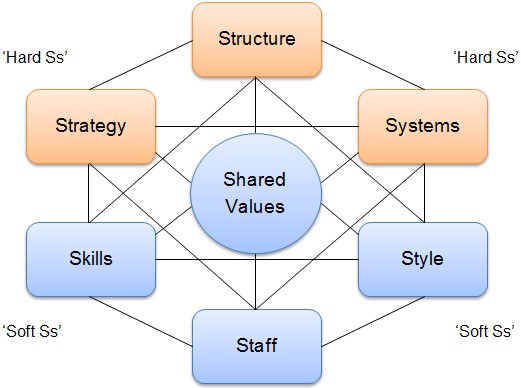
Figure:
After analyzing these seven elements, we have found out that there is a gap in the market that can be fulfilled by taking proper steps. The marketing team found out that the result is positive that means that the gap exists and it can be handled properly.
- The percentage rule: The beginners can use this rule as it is a very common rule to use analyze the market gap. The required information for this tool is primary and secondary data. Based on these data, the tools will give the idea of whether the entrepreneur should go further with the business concept in mind or not. Though the rule is traditional rule, it is very easy to use to analyze the market gap.
- Surveys: Entrepreneurs can also get the answers of their specific queries by performing the survey. They can take necessary steps by following the survey as the information generated from the survey is primary information. The survey gives both the important insights about the condition of the customers and the competitive information. After analyzing the survey it is found that there is a demand for burger in the market and there is not so much unhealthy condition among the competitors.
LO3 Use primary and secondary data to identify market potential
P3: Presenting data needed to support gap analysis in the evaluation of a specific entrepreneurial idea
Using primary data to support gap analysis: the primary data is one of the strongest sources of authentic information as it is collected from the potential customers directly. While conducting the primary data collection, the surveyors can evaluate the customers’ responses directly. If the outcomes of primary data collection seem positive, the entrepreneur will take further steps. As a part of conducting the report, I have collected some information for 'The Burger Bar' about the customers and the market. The results of the survey are shown in the following table:
- Do you prefer Burgers as fast-food item?
|
Responses generated |
Number of people surveyed |
|
Yes |
250 |
|
No |
30 |
|
Occasionally |
20 |
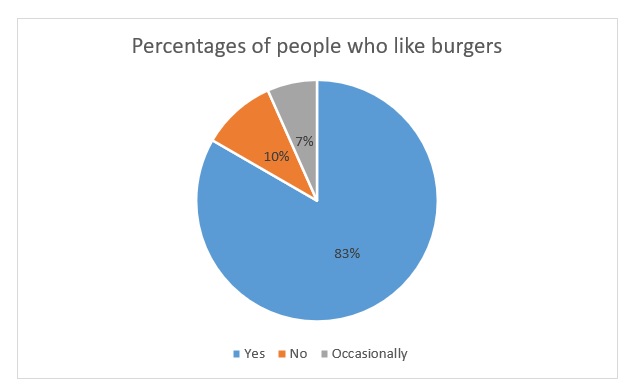
Figure: Percentages of people who like burgers (Self-creation)
From the pie chart, it can be said that almost all of the people consider burger as a fast-food item. Among the participants, 83% of them considers burgers as a fast-food item and 10% of the participant eat burgers occasionally. The respondents who take burgers occasionally can be directed to regular consumer if proper marketing effort is given. For example, giving some discounts for purchasing heavy items or giving a membership card so that they can purchase from the shop on a regular basis. However, 7% of respondents think that the burger is not a fast-food item.
- How often you purchase burgers in a week?
|
Responses generated |
Number of Respondents |
|
Once |
60 |
|
Twice |
135 |
|
Thrice or more |
105 |
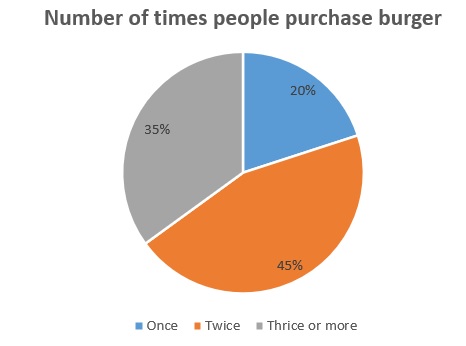
Figure: Number of times people purchase burger (Self-creation)
We asked the potential customers to know about their purchasing and consumption behavior of burger. We found that 45% of the respondents purchase burger for himself or for his family members. And 35% of respondents purchase burger at least twice. Only 20% of the respondents told that they purchase burger once in a week.
- Do you think that the services provided by the burger shop are sufficient?
|
Responses Generated |
Number of people surveyed |
|
Highly Satisfied |
95 |
|
Satisfied |
65 |
|
Unsatisfied |
115 |
|
Highly unsatisfied |
25 |
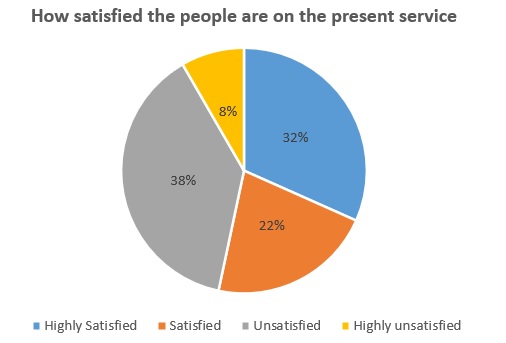
Figure: How satisfied the people are in the present service (Self-creation)
From the analysis, it has been found that 22% of the respondents are satisfied with the current service provided by different burger shops. Where, 38% of the respondents are not unsatisfied with the current service condition. From their responses it can be said that the service quality is not that much effective that can draw the customers’ attention. If proper services can be provided, the people will surely come the burger shop because the prefers proper service from the shops. From this analysis, it also can be predicted that there is a gap in the market condition and it should be fulfilled properly.
- Do you prefer buying burgers through online?
|
Responses Generated |
Number of people surveyed |
|
Yes |
210 |
|
No |
50 |
|
Probably |
40 |
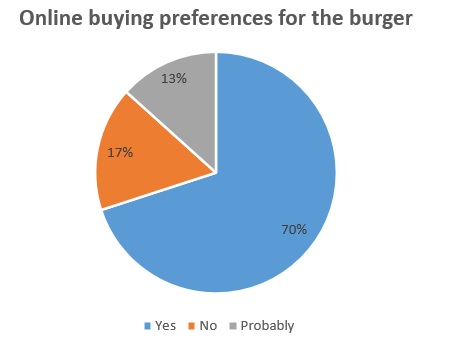
Figure: Online buying preferences for the burger (Self-creation)
In our survey, we also asked the respondents about their online purchasing preferences. From there responses, we have found out that 70% of the respondents prefer purchasing burger through online (Fernando, 2011). So, the company should take steps to deliver the burger through online. 13% of the respondents are not sure about their choices. So, if we take proper steps we can surely attract this group also.
P4: Interpreting data appropriately to provide evidence of market potential
Interpreting data: we already collected the primary information that we have provided in the previous section. Now, we will try to interpret the data by using different statistical tools like mean, mode, median and standard deviation.
- Do you prefer Burgers as fast-food item?
|
Responses generated |
Number of people surveyed |
|
Yes |
250 |
|
No |
30 |
|
Occasionally |
20 |
Calculating Mean: Mean =250+30+20/3
= 100
Here, the mean value is 100. However, from the mean value, we cannot conclude any decision as the outcomes include both positive and negative answers. The other items such as, median, mode and standard deviation will be used for interpreting the results.
Calculating Mode: Here, we have found that the most repetitive outcome is “Yes”. From this analysis, it can be said that almost all of the people consider burger as a fast-food item.
Calculating Median: to calculate the median, the date should be arranged properly. After organizing the data, we have found out the series as 250,30,20. So, the median value here is 30. As the median comes in the middle of the data set, the other values will fall below or above the median value.
Calculating Standard Deviation:

From the calculation, we have found out that the standard deviation is 130 which indicates the data is dispersed from the mean. Here the mean value is 100. The signification of people saying “Yes” is larger here.
- How often you purchase burgers in a week?
|
Responses generated |
Number of Respondents |
|
Once |
60 |
|
Twice |
135 |
|
Thrice or more |
105 |
Calculating Mean: Mean = 135+105+60/3
= 100
Here, the mean value is 100. However, from the mean value, we cannot conclude any decision. The other items such as, median, mode and standard deviation will be used for interpreting the results.
Calculating Mode: Here, we have found that the most repetitive outcome is “Twice”. And the second larger outcome is Thrice.
Calculating Median: After organizing the data, we have found out the series as 135,105,60. So, the median value here is 105. As the median comes in the middle of the data set, the other values will fall below or above the median value.
Calculating Standard Deviation:

From the calculation, we have found out that the standard deviation is 37.749 which indicates the data is not that much dispersed from the mean. Here the mean value is 100. The preferences among the people almost similar.
- Do you think that the services provided by the burger shop are sufficient?
|
Responses Generated |
Number of people surveyed |
|
Highly Satisfied |
95 |
|
Satisfied |
65 |
|
Unsatisfied |
115 |
|
Highly unsatisfied |
25 |
Calculating Mean: Mean = 115+95+65+25/4
= 75
Here, the mean value is 100. However, from the mean value, we cannot conclude any decision. The other items such as median, mode and standard deviation will be used for interpreting the results.
Calculating Mode: Here, we have found that the most repetitive outcome is “Unsatisfied”. However, some people perception regarding the service is quite good.
Calculating Median: After organizing the data, we have found out the series as 115,95,65,25. So, the median value here is 80. As the median comes in the middle of the data set, the other values will fall below or above the median value.
Calculating Standard Deviation:

From the calculation, we have found out that the standard deviation is 39.157 which indicates the data is dispersed to some extent from the mean. Here the mean value is 75. Some people here are satisfied while some other are unsatisfied.
- Do you prefer buying burgers through online?
|
Responses Generated |
Number of people surveyed |
|
Yes |
210 |
|
No |
50 |
|
Probably |
40 |
Calculating Mean: Mean =210+50+40/3
= 100
Here, the mean value is 100. However, from the mean value, we cannot conclude any decision. The other items such as median, mode and standard deviation will be used for interpreting the results.
Calculating Mode: Here, we have found that the most repetitive outcome is “Yes”. From this analysis, it can be said that almost all of the people prefer buying through online.
Calculating Median: After organizing the data, we have found out the series as 210,50,40. So the median is 50, which means the other values can fall below or above it.
Calculating Standard Deviation:

From the calculation, we have found out that the standard deviation is 95.39 which indicates the data is dispersed to some extent from the mean. Here the mean value is 100. Most of the people prefer buying through online system.
Using secondary data to support gap analysis: there are numerous secondary sources of information about this industry. After analyzing this information, we thought that the burger business will do better. Some of the information are given below with some details:
The demand of burgers in the market of the UK: the number of workers in UK has increased over the years and the people don’t want to waste their time by cooking food (Worthington and Britton, 2015). So, they prefer buying fast-food from local shops. Burger is the most common item here. The following statistic shows that the value of eating out in UK market has increased from 2008 to 2017.
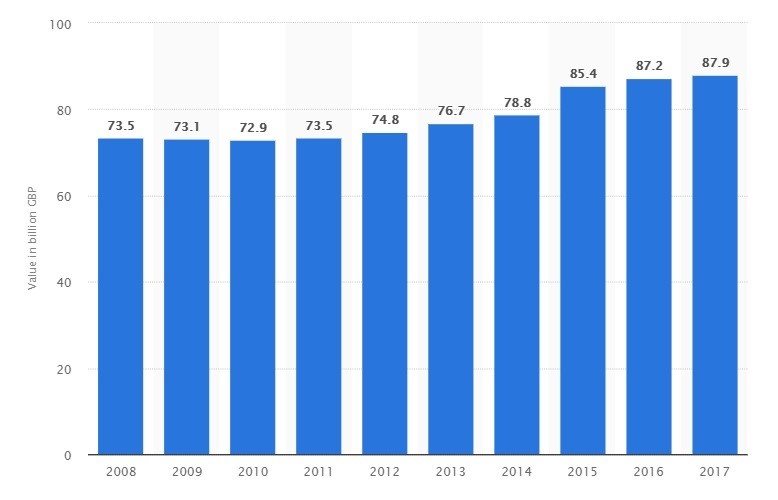
Figure: The value of eating out in UK market (Statista, 2018)
Here, the expenditure is presented on annual basis. In 2017, the total volume sale is the highest of all the years. In 2008, the market value of eating out was approximately 73.5 billion British pounds and in 2017, the market value is 87.9 billion British pounds.
Smartphone users of the UK:“The Burger Hub” is also considering to sale its products through online sites so that it can save the time of its customers by delivering the products based on the orders (SALEEM, 2015). Here, the volume of smartphone user is a critical factor that will provide the insight whether the online system will be useful or not. The following statistic shows the historical and estimated number of smartphone users in UK.
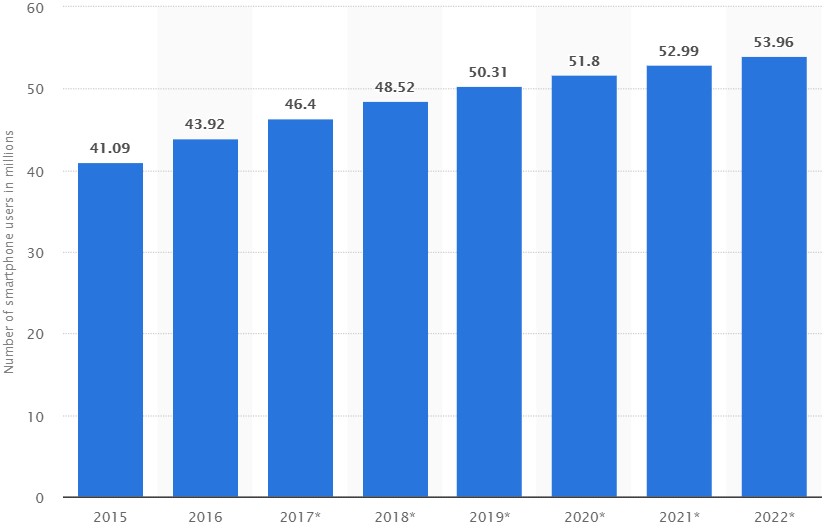
Figure: Historical and estimated number of smartphone users in UK (Statista, 2018)
Here, the number of smartphone users was lower in 2015 and it has been increased over the years. In 2015, the smartphone users in UK was about 41.09 million and up to 2018 it is 48.52 million. The growth rate is significant here (Business environment, 2009). It is estimated that in 2022, the number of smartphone users will reach 53.96 million which indicates a positive sign in the online food markets. “The Burger Hub” will use its own software from which the users can check the available products, its prices, any new offering and some other common categories. The customers also can purchase the products through online and make payments. The increasing number of smartphone users give a positive sign for the potential of “The Burger Hub”.
LO4 Evaluate the entrepreneurial idea in the context of the market and competitors and make an assessment of potential viability
P5: Applying a SWOT framework to collate evidence to support an objective assessment of a specific entrepreneurial idea
SWOT (Strengths, Weaknesses, Opportunities and Threats) analysis is a useful technique that identifies the internal and external factors that affect the company significantly (Business strategy series, 2008). Like every other businesses, The Burger Hub should consider its internal strengths and weaknesses and external opportunities and threats. The SWOT analysis by considering “The Burger Hub” has given below with a graph:
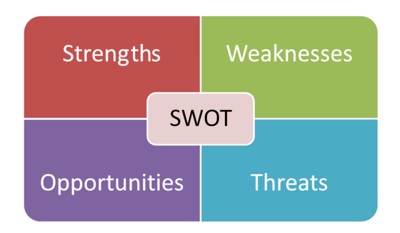
Figure: SWOT Analysis (Fonneland, 2017)
- Strengths: The main strength of “The Burger Hub” is that the employees of the business are very much hardworking and some of them are experience as they worked in the same industry before. If the people are experienced, they other functions of the organization run very well. The employees of the business serve the customers better than that of other competitors (Botten, 2006). So, it will give a competitive edge over the other competitors. Another strength of the business is that it will make quality burger which is very tasty and also good for health. The company will communicate with the customers through mobile phones an get the on-demand order which will increase the brand recognition quickly.
- Weaknesses: there are some weaknesses that should be considered before making any implementation. If the management properly identifies the area of weaknesses, it will take some specific actions to remove the weaknesses quickly. The main weaknesses of the business are that it has not sufficient capital for installing the quality materials that are vital to run the business perfectly. In order to remain competitive with other firms, the business should install sophisticated technologies so that it can run properly. Another weakness of the business is that it is depended solely on selling burgers. If the demand for burgers falls, the business will not be able to compensate the losses.
- Opportunities: The entrepreneurs should search for new opportunities as it will enhance the returns on the capital employed. The opportunities do not come all the time and there are a lot of competitors who search for the right opportunities continuously (Aras and Crowther, 2012). “The Burger Hub” will create the opportunity by increasing their brand recognition in the local market. Then, it will operate in different areas of the country. The company may introduce some new products in its product line so that it can reduce the risk that comes from narrower product line.
- Threats: the threats can come from internal environment and external environment. The competitors are the main source of threats to the business. Some other threats come from government regulations, community guidelines etc. There are some established competitors such as Five Fields, McDonald’s etc.
P6: Evaluating the competitive and market environments in which the idea will be launched to assess potential viability
Competitive analysis and analyzing market environment: The competitors are the main source of threats for the business. There are some established competitors such as Five Fields, McDonald’s etc. A competitive analysis helps the entrepreneur to take the best decision which will give the best outcome. The competitive analysis for “The Burger Hub” is given below:
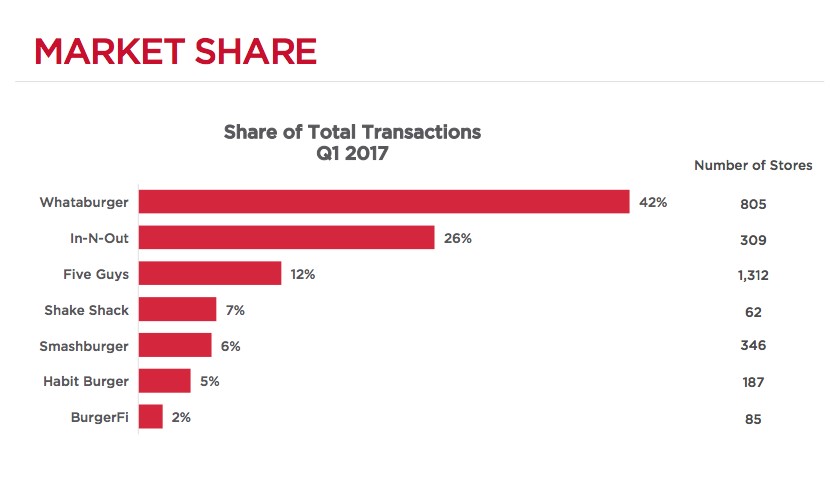
Figure: Competitive scenario of burger business (Walker, 2018)
From this figure it can be concluded that there is an intense competition among the competitors. The competition becoming larger when some new participants enter the market. All the competitors are trying to increase their market share by satisfying the customers (Baye and Prince, 2017). From this graph it can be observed that Whataburger has the largest market share in selling the burgers in UK as it holds 42% of the market share which is almost half of the total market share. The second largest burger house is In-N-Out which holds 26% of the total market share which is one-fourth of the total market share. Although Five Guys has the largest number of stores but holds the third position in the burger selling market. These giant business fight against one another by selling superior service to its customers to control the market share. “The Burger Hub” will focuses on small business as its peers because it cannot fight against the giant business in the initial period.
The overall environment for food business is favorable to “The Burger Hub” because the capital requirement for food industry is lower than other industries (Griffin et al., 2014). For example, Technical industry and Financial industry require a large amount of capital in the beginning period. The risk exposure in the food industry is also lower compared to other industries because the demand for foods doesn’t fluctuate that much and it is constant over the time. However, some unexpected events may reduce the market demand for burger.
Conclusion
It can be concluded from the report that the entrepreneurs should think very carefully before implementing any business ideas. They should take the action when they are convinced enough that the business has true prospects (Fonneland, 2017). Entrepreneurs play a big role in UK market because they introduce new business ideas which contribute to the development of UK’s economy. The UK’s market is such a place where the entrepreneurs can perform their required activities without any constraints. In this report, the business idea for “The Burger Hub” has been analyzed by considering different types of theories and market data. The entrepreneur should have the courage to face unexpected situations because the entrepreneurial activities are riskier than other activities.
References
Aras, G. and Crowther, D. (2012). Business strategy and sustainability. Bingley, U.K.: Emerald.
Barnett, R., Barnett, R. and Barnett, R. (2008). Managing business forms. Belconnen, A.C.T.: Robert Barnett and Associates.
Baye, M. and Prince, J. (2017). Managerial economics and business strategy. New York, NY: McGraw-Hill Education.
Botten, N. (2006). Management accounting. Oxford: CIMA.
Brooks, I. and Weatherston, J. (2000). The business environment. Harlow, England: Financial Times/Prentice Hall.
Business environment. (2009). Amsterdam: Elsevier/Pergamon Flexible Learning.
Business strategy series. (2008). [Bradford, England]: Emerald.
Fernando, A. (2011). Business environment. Chennai: Pearson.
Fonneland, T. (2017). Contemporary shamanisms in Norway. Oxford: Oxford University Press.
Ford, D. (2003). Managing business relationships. Chichester, West Sussex: J. Wiley.
Ford, D. (2011). Managing business relationships. Hoboken, N.J: Wiley.
Griffin, R., Ebert, R., Starke, F., Dracopoulos, G. and Lang, M. (2014). Business. Toronto: Pearson Canada.
Reuvid, J. (2010). Managing Business Risk: A Practical Guide to Protecting Your Business. London: Kogan Page.
Reuvid, J. (2014). Managing business risk. London: Kogan Page.
SALEEM, S. (2015). BUSINESS ENVIRONMENT. [S.l.]: PEARSON EDUCATION INDIA.
Schaffer, R., Agusti, F. and Dhooge, L. (2004). International business law and its environment.
Treviño, L. and Nelson, K. (2004). Managing business ethics.
Worthington, I. and Britton, C. (2015). The business environment. Harlow [u.a]: Pearson.
Diana, K. a., 2016. All in a startup: launching a new idea when everything is on the line. Hoboken, New Jersey: Wiley.
Hisrich and Peters, M. (2015). Entrepreneurship. New York: McGraw-Hill.
Jeffrey, Cornwall and. (2014). Entrepreneurial Financial Management: An Applied Approach. 5 ed. Armonk, NY: Sharpe.
Jeffry A., and Spinelli, S. (2016). New Venture Creation: Entrepreneurship for the 21st Century. Boston: McGraw-Hill.
McLean, S. (2014). The basic of interpersonal communication. Boston, MA: Ally & Bacon.


